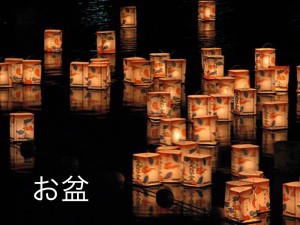"Fires were lit outside the home to light the way for family spirits and welcome them back home."
 In the past, I have written about several Asian holidays where the ancestors and the dead in general are venerated and presented with offerings, most specifically Qing Ming and the Festival of the Hungry Ghosts. On the latter, it is believed that the souls of one’s ancestors are able to return to visit family and also another class of spirit known as “Hungry Ghosts” are particularly active as well. These are the spirits who have nobody to pray for them and during this festival, they receive ample offerings on home altars and in temples. A similar holiday known as Obon exists in Japan and has been celebrated there for over 500 years. Obon no doubt has its origins in traditional Chinese holidays honoring departed loved ones, yet over the centuries in Japan the customs surrounding this three day festival have adopted their own local flavor and parts of the holiday have taken on carnival-like qualities while still preserving its deeply spiritual roots.
In the past, I have written about several Asian holidays where the ancestors and the dead in general are venerated and presented with offerings, most specifically Qing Ming and the Festival of the Hungry Ghosts. On the latter, it is believed that the souls of one’s ancestors are able to return to visit family and also another class of spirit known as “Hungry Ghosts” are particularly active as well. These are the spirits who have nobody to pray for them and during this festival, they receive ample offerings on home altars and in temples. A similar holiday known as Obon exists in Japan and has been celebrated there for over 500 years. Obon no doubt has its origins in traditional Chinese holidays honoring departed loved ones, yet over the centuries in Japan the customs surrounding this three day festival have adopted their own local flavor and parts of the holiday have taken on carnival-like qualities while still preserving its deeply spiritual roots.
Obon is traditionally celebrated in the middle of August over a three day period usually beginning on the 15th. Due to a calendar change during the Meiji period, in some parts of Japan, most notably in and around Tokyo, it is celebrated in mid-July, but the most common date still remains the 15th of August which coincides with the traditional Chinese date for the Festival of the Hungry Ghosts from which Obon descends. People construct altars in their homes on which they present offerings of food and incense for their departed loved ones and invite them to return by ringing a bell, a tradition that is strikingly similar to a practice of ringing a bell to call the orishas in the Santeria or Regla de Ocha tradition. Some people have Buddhist priests or monks preside over a service in their homes. People also visit cemeteries and clean and decorate the family graves with flowers and incense, a practice similarly observed in the West on All Saints Day and in China on Qing Ming. In years past, fires were lit outside the home to light the way for family spirits and welcome them back home. This tradition is still occasionally seen in rural areas. Finally, on the last day of Obon, people make paper lanterns holding a candle and float them down a river or other body of water to symbolize the souls of loved ones traveling back to the spirit world for another year.
Today Obon has taken on a more carnival like spirit with concerts, fireworks and amusement parks rides being set up for the occasion, yet still many people are returning to the traditional way of celebrating the holiday perhaps out of a need to connect with their roots and reclaim a sense of spirituality while living in a hectic secular society. Many Obon services are held as well in Buddhist temples and Japanese cultural centers across Europe and North America. If you would like to honor your ancestors during Obon, you can simply create an altar or sacred space in your home and adorn it with photos of departed loved ones and place offerings such as fruit and incense while inviting them back to this world during this special time of year. You may also wish to place a candle in your window or outside your home to welcome them back from the spirit world. I hope you have enjoyed this brief discussion of this fascinating celebration and as always I wish you peace, happiness and abundant blessings!